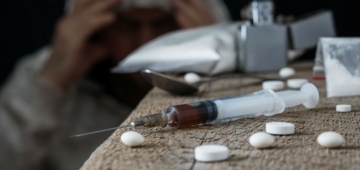- 06 December 2021
The Health and Social Care Select Committee has today published the report of its inquiry into illicit drug harms, calling on the Government to overhaul and upgrade current drugs policy.
RSPH, who submitted evidence to the inquiry earlier this year, is delighted that the Committee has taken a bold and evidence-based approach, recommending that:
- Responsibility for drugs strategy to move from the Home Office to the Department of Health and Social Care, in order that drugs policy be treated first and foremost as an issue of health, and not of criminal justice.
- The Government consult on decriminalisation of drug possession for personal use from a criminal offence to a civil matter, citing the Portuguese system as a model from which lessons should be drawn.
- Drug treatment services be funded properly as a matter of urgency.
- Funding commitments to harm reduction services, including: needle and syringe exchanges, take-home naloxone, and piloting of Drug Consumption Rooms in areas of high need.
These calls are closely aligned with those made in Taking a New Line on Drugs, RSPH’s landmark report into taking a public health approach to UK drugs policy.
At 51 deaths per million of the population, England and Wales’ drug death rate is now more than double the European average of 22 per million, and more than 12 times that of Portugal. Scotland’s drug death rate saw a 27% increase in the past year, and is now the highest of all EU countries. On top of this, funding for drug treatment has been cut by 27% on average across England, with cuts falling deepest in areas with the most drug-related deaths.
Shirley Cramer CBE, Chief Executive of RSPH, said: “With drug-related deaths at record high levels, we are in dire need of reforms that are rooted in compassion and evidence – two elements that have been absent from our drugs policy for some time. It’s therefore fantastic to see the Select Committee setting forward these much needed proposals, and we would encourage the Government to take them forward swiftly and with urgency.”
“The current model of prohibition and enforcement is now outdated and discredited, and a paradigm shift towards a public health approach is more crucial than ever. A vital first step is the treatment of those who are dependent on drugs as patients in need of support, not as criminals – and it’s excellent to see this acknowledged in the Committee’s report.”



